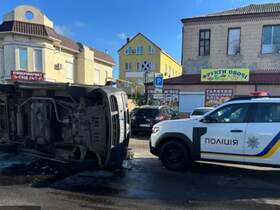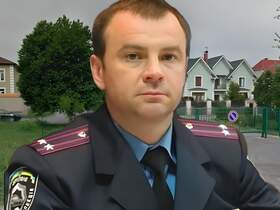The Horovyi brothers assembled a "rescue team" for SACI

The Horovyi brothers assembled a "rescue team" for SACI
The government’s decision to liquidate the State Architectural and Construction Inspectorate (SACI) due to the corruption that has accompanied this structure from the very beginning has encountered resistance. Initially, this resistance was mostly passive, but recently a group of opponents of urban planning reform has consolidated and is ready to move to the active phase.
It has been said at the highest level for several years now that SACI is one of the most corrupt public structures in Ukraine. The scale of corruption in urban planning is estimated at a minimum of $100 million annually. However, at the beginning of March this year, President Volodymyr Zelenskyy posed a task to the new Prime Minister Denys Shmyhal to liquidate SACI.
Two weeks later, Shmyhal’s government presented a reform plan that includes the liquidation of SACI as an agency and the division of its functions among three independent structures. The State Urban Planning Service will handle registration, the State Technical Regulation Agency will regulate construction norms, and the functions of construction supervision will be performed by the State Urban Planning Inspectorate.
Such a radical decision with a complete dismantling of the structure seems to be the only possible option in the current situation. Long-standing corruption schemes have penetrated so deeply at all levels of the inspectorate that they can only be eradicated by demolishing all buildings along with their foundations. A simple change in leadership or other measures that do not affect the entire system would, at best, have a temporary cosmetic effect.
Given how many officials and unscrupulous developers have been fed by SACI activities for many years, such radical measures were bound to meet resistance. Today, a group has been formed whose goal is to discredit the reform by any means and preserve SACI, even in a somewhat reduced form, which would allow maintaining all schemes in urban planning and restoring what has already been destroyed fairly quickly. It appears that this group of interested individuals has been united around trying to remain as unpublicized as possible, but nevertheless, they have earned a scandalous reputation, brothers Oleksiy and Yuriy Horovyi, who have been closely tied to the construction business for almost ten years and have significant influence on SACI. However, since December 2020, the brothers’ opportunities in SACI have sharply narrowed, and after the liquidation of the structure could vanish altogether, which probably makes them the main drivers of resistance to reform.
Who are the Horovy brothers and who are their allies
The Horovyi brothers were first talked about in Ukraine in the late 2000s and early 2010s in connection with the Kyiv funeral services market, which the brothers supposedly controlled under the protection of then Deputy Mayor of Kyiv Leonid Chernovetskyi and Denys Bass. The media also reported that during Viktor Yanukovych’s times, the funeral business of the Horovy brothers was covered by the notorious Yuriy Ivanyushchenko. Both Bass and Ivanyushchenko, we remind, have already fled Ukraine. But the Horovy brothers, staying mainly in the shadows, continue their activities to this day.
In connection with corruption in construction, the names of the Horovy brothers mainly began to be mentioned after the Revolution of Dignity. In the media, Oleksiy Horovyi is mentioned as a person who in 2014 was sent to Odesa to "put developers on subscription fees" under the protection of Oleksandr Rybak, the son of Volodymyr Rybak, speaker during Yanukovych’s times. In recent years, the Horovy brothers have been mentioned as "overseers of SACI." The Horovy brothers were also spotted at a much-talked-about wedding in Saint-Tropez in August 2019, where besides the then-head of the President’s Office Andriy Bohdan, there was also developer Andriy Vavrysh, the "grey cardinal" of Odesa Volodymyr Halanternik. Both, to note, actively cooperate with the brothers.
The Horovy brothers’ business is actively supported by Oleksiy Horovyi’s civil wife, Tetyana Plachkova, a current Member of Parliament from the OPFL, originally from Odesa. It is her close friends Olena Aykhel and Oksana Butkovska, who held positions in SACI, that the media call those who ensure the issuance of construction permits. Alternatively, it is quite possible that they delay the issuance of permits for those who have not paid the necessary bribe.
As noted by the Minister of Digital Transformation Mykhailo Fedorov, until December 2019, there was even a special script in SACI’s electronic register that concealed documents in the register. This allowed managing the register manually, "hiding" permit documents for some and "accelerating" them for those who paid the appropriate fees. The media repeatedly described that it was necessary to pay from 5 to 20 or more dollars per square meter for a construction permit.
For this scheme to work, essentially two things are necessary. Firstly, the existence of a single agency that combines permitting, regulatory, and supervisory functions. Secondly, the presence inside this agency of people who could stop or accelerate the movement of specific documents as needed. That is why the liquidation of SACI could be fatal for the Horovy "business" because, in addition to dividing functions among three agencies, the liquidation will be accompanied by a complete replacement of personnel, and implementing their people into the three new agencies might be simply impossible.
Of course, the Horovyi brothers are not alone in their desire to cancel the liquidation of SACI. Their ally in this situation is not only officials interested in corruption income but also unscrupulous developers who find it advantageous to win competition through "proper" connections and kickbacks, and the money spent can always be compensated by not necessarily adhering to all building norms.
One of the partners of the Horovys in the fight against the SACI reform seems to be the Minister for Community and Territorial Development Oleksiy Chernyshov, who is directly responsible for conducting the reform and who can be found to have personal interests in the construction sector. Before coming to power, he was a developer himself. Moreover, the media repeatedly wrote about Chernyshov’s connections with well-known Kyiv developers Andriy Vavrysh and Dmytro Isayenko, for whom Chernyshov’s appointment as minister became a real jackpot since while he is delaying the creation of a new body, they can almost uncontrollably continue their developments in the capital, the legality of which many consider doubtful. For example, the scandalous development of the Dnipro riverbank in Podil.
Another ally of the Horovoy in the struggle to cancel the SACI reform can be considered another renowned developer, the head of the Confederation of Builders of Ukraine Lev Partskhaladze. The vice-president of this confederation, by the way, is Isaenko.
How they will "save" SACI
It seems that all these people are now starting active actions to discredit and stop the SACI reform. Most likely, their main goal will be to preserve SACI as a single agency and prevent its complete liquidation. Allegedly, the liquidation of SACI will lead to a complete collapse of the construction industry, leading to loss of budget revenues, elimination of jobs, a mass of unfinished projects, and consequently, disgruntled investors, problems with loan repayments, and other issues.
And supposedly, to prevent all this from happening, SACI must be preserved. Since the main reason for liquidation is corruption, it is necessary not to liquidate the inspectorate but just to purge it of corruption, which sounds generally logical, and it will be less painful for the industry. In doing so, SACI defenders will place special emphasis on the fact that the ones supporting the preservation of the structure will be the developers themselves, who, as those from whom corruption fees are collected, should be the first to demand the liquidation of this structure.
In addition, the group of SACI saviors will likely try to inspire some kind of corruption scandal around the liquidation of the inspectorate to present the fight against corruption as merely a redistribution of corruption flows. The possibility of such a development was mentioned in a recent interview by the First Deputy Head of the President’s Office Serhiy Trofymov. According to him, now "dirt is being prepared" to be thrown at him and the President’s Office regarding urban planning reform. "This is already a principled issue. We will push through. This will be a successful case in the fight against corruption," he stated in particular.
In fact, such active opposition to the liquidation of SACI means only one thing: it seems that the President and the Prime Minister have chosen the only possible way to fight corruption in the construction sector. After all, the complete liquidation of an agency mired in schemes and the division of its functions among three structures will not only break up existing schemes over the years but also require a complete personnel reboot. No matter how much you purge SACI of old staff, no matter how cosmetically you alter its work, and whatever re-attestation you conduct—among the employees, there will still be people, even at the lower level, associated with the schemes practiced there, through which "overseers" and unscrupulous developers can quickly restore former orders.
The only way to finally end corruption in construction is a full and final dismantling of the existing system with personnel purging and the creation of a completely new system for obtaining construction permits and controlling it with minimal involvement of officials and maximum digitalization and automation. Only then will construction in our country finally cease to be a feeding trough for officials and those close to them.
Topics: Mykhailo FedorovOksana ButkovskaVolodymyr HalanternikOleksandr RybakDenys BassYuriy HorovyiDenys ShmyhalTetyana PlachkovaAndriy VavryshOleksiy HorovyiSACI

Comments:
comments powered by DisqusЗагрузка...
Our polls
Show Poll results
Show all polls on the website











